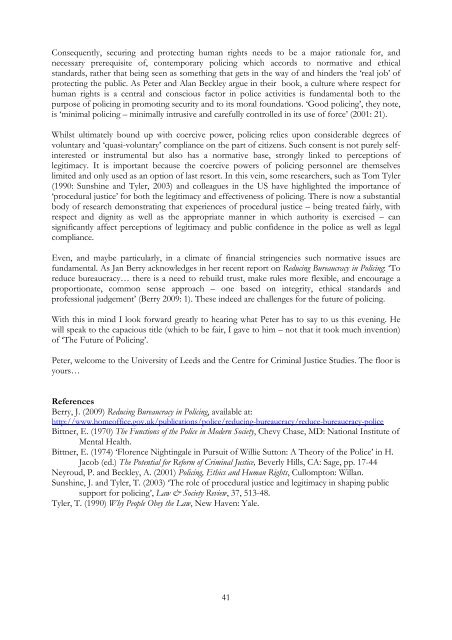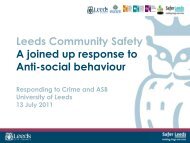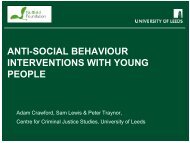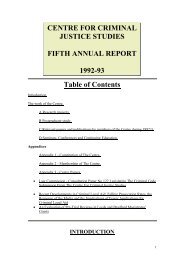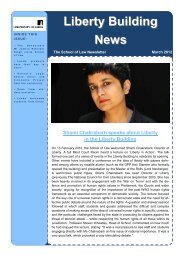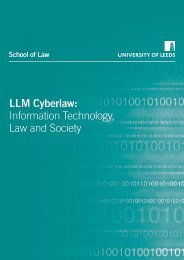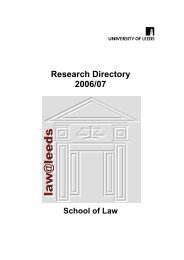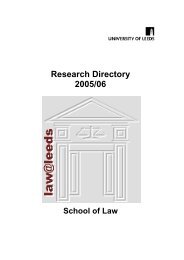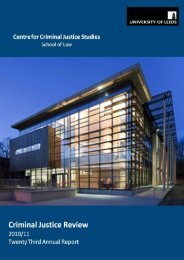Consequently, securing <strong>and</strong> protecting human rights needs to be a major r<strong>at</strong>ionale for, <strong>and</strong>necessary prerequisite <strong>of</strong>, contemporary policing which accords to norm<strong>at</strong>ive <strong>and</strong> ethicalst<strong>and</strong>ards, r<strong>at</strong>her th<strong>at</strong> being seen as something th<strong>at</strong> gets in <strong>the</strong> way <strong>of</strong> <strong>and</strong> hinders <strong>the</strong> ‘real job’ <strong>of</strong>protecting <strong>the</strong> public. As Peter <strong>and</strong> Alan Beckley argue in <strong>the</strong>ir book, a culture where respect forhuman rights is a central <strong>and</strong> conscious factor in police activities is fundamental both to <strong>the</strong>purpose <strong>of</strong> policing in promoting security <strong>and</strong> to its moral found<strong>at</strong>ions. ‘Good policing’, <strong>the</strong>y note,is ‘minimal policing – minimally intrusive <strong>and</strong> carefully controlled in its use <strong>of</strong> force’ (2001: 21).Whilst ultim<strong>at</strong>ely bound up with coercive power, policing relies upon considerable degrees <strong>of</strong>voluntary <strong>and</strong> ‘quasi-voluntary’ compliance on <strong>the</strong> part <strong>of</strong> citizens. Such consent is not purely selfinterestedor instrumental but also has a norm<strong>at</strong>ive base, strongly linked to perceptions <strong>of</strong>legitimacy. It is important because <strong>the</strong> coercive powers <strong>of</strong> policing personnel are <strong>the</strong>mselveslimited <strong>and</strong> only used as an option <strong>of</strong> last resort. In this vein, some researchers, such as Tom Tyler(1990: Sunshine <strong>and</strong> Tyler, 2003) <strong>and</strong> colleagues in <strong>the</strong> US have highlighted <strong>the</strong> importance <strong>of</strong>‘procedural justice’ for both <strong>the</strong> legitimacy <strong>and</strong> effectiveness <strong>of</strong> policing. There is now a substantialbody <strong>of</strong> research demonstr<strong>at</strong>ing th<strong>at</strong> experiences <strong>of</strong> procedural justice – being tre<strong>at</strong>ed fairly, withrespect <strong>and</strong> dignity as well as <strong>the</strong> appropri<strong>at</strong>e manner in which authority is exercised – cansignificantly affect perceptions <strong>of</strong> legitimacy <strong>and</strong> public confidence in <strong>the</strong> police as well as legalcompliance.Even, <strong>and</strong> maybe particularly, in a clim<strong>at</strong>e <strong>of</strong> financial stringencies such norm<strong>at</strong>ive issues arefundamental. As Jan Berry acknowledges in her recent report on Reducing Bureaucracy in Policing: ‘Toreduce bureaucracy… <strong>the</strong>re is a need to rebuild trust, make rules more flexible, <strong>and</strong> encourage aproportion<strong>at</strong>e, common sense approach – one based on integrity, ethical st<strong>and</strong>ards <strong>and</strong>pr<strong>of</strong>essional judgement’ (Berry 2009: 1). These indeed are challenges for <strong>the</strong> future <strong>of</strong> policing.With this in mind I look forward gre<strong>at</strong>ly to hearing wh<strong>at</strong> Peter has to say to us this evening. Hewill speak to <strong>the</strong> capacious title (which to be fair, I gave to him – not th<strong>at</strong> it took much invention)<strong>of</strong> ‘The Future <strong>of</strong> Policing’.Peter, welcome to <strong>the</strong> University <strong>of</strong> Leeds <strong>and</strong> <strong>the</strong> Centre for Criminal Justice Studies. The floor isyours…ReferencesBerry, J. (2009) Reducing Bureaucracy in Policing, available <strong>at</strong>:http://www.home<strong>of</strong>fice.gov.uk/public<strong>at</strong>ions/police/reducing-bureaucracy/reduce-bureaucracy-policeBittner, E. (1970) The Functions <strong>of</strong> <strong>the</strong> Police in Modern Society, Chevy Chase, MD: N<strong>at</strong>ional Institute <strong>of</strong>Mental Health.Bittner, E. (1974) ‘Florence Nightingale in Pursuit <strong>of</strong> Willie Sutton: A Theory <strong>of</strong> <strong>the</strong> Police’ in H.Jacob (ed.) The Potential for Reform <strong>of</strong> Criminal Justice, Beverly Hills, CA: Sage, pp. 17-44Neyroud, P. <strong>and</strong> Beckley, A. (2001) Policing, Ethics <strong>and</strong> Human Rights, Cullompton: Willan.Sunshine, J. <strong>and</strong> Tyler, T. (2003) ‘The role <strong>of</strong> procedural justice <strong>and</strong> legitimacy in shaping publicsupport for policing’, <strong>Law</strong> & Society Review, 37, 513-48.Tyler, T. (1990) Why People Obey <strong>the</strong> <strong>Law</strong>, New Haven: Yale.41
The Future <strong>of</strong> PolicingPeter Neyroud *I’m not going to try <strong>and</strong> speak about <strong>the</strong> entire ‘Future <strong>of</strong> Policing’, th<strong>at</strong> would be quite beyondme, but I am going to try <strong>and</strong> focus on a number <strong>of</strong> str<strong>and</strong>s. It is actually an interesting week to best<strong>and</strong>ing up to talk about <strong>the</strong> future <strong>of</strong> policing because actually, even if I had a larger case, Icouldn't drag with me all <strong>the</strong> documents th<strong>at</strong> have come out this week alone. Nor indeed could Icompress, certainly not this year’s contributions to <strong>the</strong> deb<strong>at</strong>e because actually this I think used tobe a library, you would be about half full.I just thought I would start by doing a little bit <strong>of</strong> a trot around, just to get a bit <strong>of</strong> a flavour <strong>of</strong>wh<strong>at</strong>’s to come. And obviously it’s a run up to an election <strong>and</strong> I’ve got – I was an <strong>at</strong>tendee <strong>at</strong> IpsosMori’s Christmas event which always comes with a set <strong>of</strong> PowerPoint slides from Ben Page. And<strong>the</strong>y were particularly talking about wh<strong>at</strong> things <strong>the</strong> public are concerned about, <strong>and</strong> notsurprisingly, crime, policing <strong>and</strong> justice are right up <strong>the</strong>re, in <strong>the</strong> top 3 or 4. There was also ano<strong>the</strong>rfascin<strong>at</strong>ing thing which in some ways contradicts Adam’s legitimacy argument - but I’ll come on tolegitimacy in a minute - which is th<strong>at</strong> <strong>the</strong> most popular Prime Minister was also <strong>the</strong> least trustedPrime Minister. Tony Blair had <strong>the</strong> lowest scores for trust <strong>and</strong> <strong>the</strong> highest scores for popularity inrecent times. And <strong>the</strong>re’s something <strong>the</strong>re th<strong>at</strong> is curiously contradictory.However, ‘a busy last few years’ would be my summary <strong>of</strong> policing. We have, if you only just goback to <strong>the</strong> bit before my agency [NPIA] came into being. We’ve had mergers, which is almost anextended deb<strong>at</strong>e <strong>and</strong> is code for ‘we’re not quite sure th<strong>at</strong> <strong>the</strong> shape <strong>of</strong> policing in <strong>the</strong> UK is fit tomeet <strong>the</strong> challenges th<strong>at</strong> are coming’; for which you could also read ‘we’re not quite sure th<strong>at</strong> <strong>the</strong>shape <strong>of</strong> policing worldwide is fit to meet <strong>the</strong> challenges th<strong>at</strong> are coming’. And I’ll try <strong>and</strong> develop<strong>the</strong> challenges th<strong>at</strong> are coming.We’ve had so many police <strong>and</strong> criminal justice <strong>and</strong> crime bills th<strong>at</strong> I’m not sure I could name <strong>the</strong>mall, but one th<strong>at</strong> has just passed into law is <strong>the</strong> Police <strong>and</strong> Crime Act 2009. And th<strong>at</strong> has farreachingchanges, in particular - back to structure - it has a major change th<strong>at</strong> talks about <strong>the</strong>powers <strong>of</strong> <strong>the</strong> centre to determine th<strong>at</strong> certain things are done in a given way across <strong>the</strong> country.Yesterday, we had a White Paper <strong>and</strong> we also had Jan Berry’s document during <strong>the</strong> course <strong>of</strong> thisweek. And in <strong>the</strong> last week or so we’ve also had… well probably a more important document in anodd sort <strong>of</strong> way, not to dismiss <strong>the</strong> White Paper th<strong>at</strong> would be highly inappropri<strong>at</strong>e for somebodyworking in a Government agency! I’m not going to dismiss <strong>the</strong> White Paper, largely because <strong>the</strong>reis a gre<strong>at</strong> deal about my agency, <strong>the</strong> NPIA, in <strong>the</strong> White Paper. But actually, in terms <strong>of</strong> <strong>the</strong> quality<strong>of</strong> policing, Dennis O’Connor’s report on public order, as a read (<strong>and</strong> it’s a big read) I think is amore seminal document. It contains some fantastic analysis <strong>of</strong> <strong>the</strong> challenges <strong>of</strong> public orderpolicing <strong>and</strong> also some quite, one or two slightly odd st<strong>at</strong>ements. There’s an extraordinaryst<strong>at</strong>ement where it says th<strong>at</strong> <strong>the</strong> British Police Service doesn’t answer to anyone but ‘<strong>the</strong> people’,which struck me as slightly odd. I didn’t know th<strong>at</strong> I was <strong>the</strong> people’s police. It sounds likesomething out <strong>of</strong> North Korea, actually, <strong>and</strong> I’m not sure th<strong>at</strong>’s <strong>the</strong> right constitutional positionei<strong>the</strong>r.Then in th<strong>at</strong> same week or so, we had <strong>the</strong> IPPR’s study <strong>of</strong> n<strong>at</strong>ional policing, which actually wasalso a kind <strong>of</strong> review <strong>of</strong> 1997 onwards. I’m not sure I – <strong>and</strong> I don’t think Sir Norman Bettison didei<strong>the</strong>r - agree with <strong>the</strong> analysis <strong>of</strong> <strong>the</strong> 1997 onwards because it seems to me <strong>the</strong>re has been quite alot <strong>of</strong> progress. But <strong>the</strong> thing it finished <strong>of</strong>f with is ‘structures’ again. It’s <strong>the</strong> structures <strong>of</strong> policingn<strong>at</strong>ionally in particular th<strong>at</strong>, in <strong>the</strong>ir analysis, don’t seem to meet <strong>the</strong> challenges.* This is an edited transcription <strong>of</strong> a talk delivered on 3 rd December 2009.42


